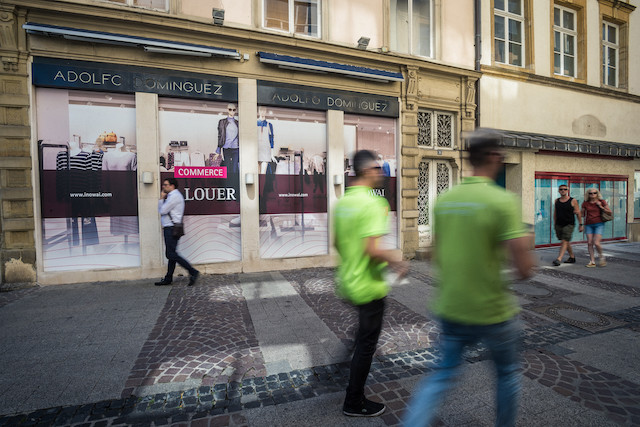Jess Bauldry: How do you explain the rapid rise in rents on shop units in Luxembourg?
Claude Bizjak: One development we see, especially in Luxembourg, is that in different areas it’s real estate [projects] that try to drag in some retailers, sometimes with questionable figures. They sign a big rent with a long contract and it [the shop site] doesn’t generate the footfall announced.
Another key moment for the retailers is when they have to negotiate the renewal of the lease. There we are seeing some phenomenal increases. At the end of the day, the retailer doesn’t have much choice. Either they accept or they have to reinvest in another location which means more costs. And often they have to rebuild their customer base.
How likely is it that there will be a decrease in retail rents as a result of the pandemic and the insolvencies it’s causing?
It’s very difficult to say. We don’t have the impression that prices will go down. In this situation, retailers and other merchants have very limited revenues. I think that the landlords need to think more long-term. If every two years you’ve a new tenant, that’s not a stable situation. I believe it’s better to have a slightly lower rent and a stable situation, a stable contract with a trusted retailer than trying to think short term and deal with contracts and legal conflicts.

Claude Bizjak, pictured, is assistant director of the country’s retail federation the CLC. Photo: CLC
What, if any, solutions have you found that could ease the situation?
I believe one answer is to have a better informed market. One project that we are working on is the retail cadastre. It’s a project I’ve built from the Pakt pro commerce, an initiative with the economy ministry and chamber of commerce. It holds all retailers, bakeries and cafés, everything related to retail. In this database we also know the vacancies.
There are some pilot projects we are running with communes in which we provide information to help them find the right shop and the right mixture. You can make an analysis based on this tool and identify which shops are missing.
How would this help the shopkeepers?
We believe on part of the solution could be to have some of the data available as open data. Then retailers could make better decisions and avoid signing a lease for a site where they cannot make money. There is a lack of public information on all this business data and it’s very expensive for retailers to get access to analysis.
Are there any other solutions you’d like to try out in Luxembourg to tackle rents?
I think we should also think of more sustainable rent models. They are used in many countries and are starting to come to Luxembourg. Models where you have a risk share: you agree on a minimum rent and the rest is calculated according to turnover.
This has the advantage that landlords are more involved and it’s in their best interest to make it work. We believe this could be beneficial to both parties and help overcome the crisis.
